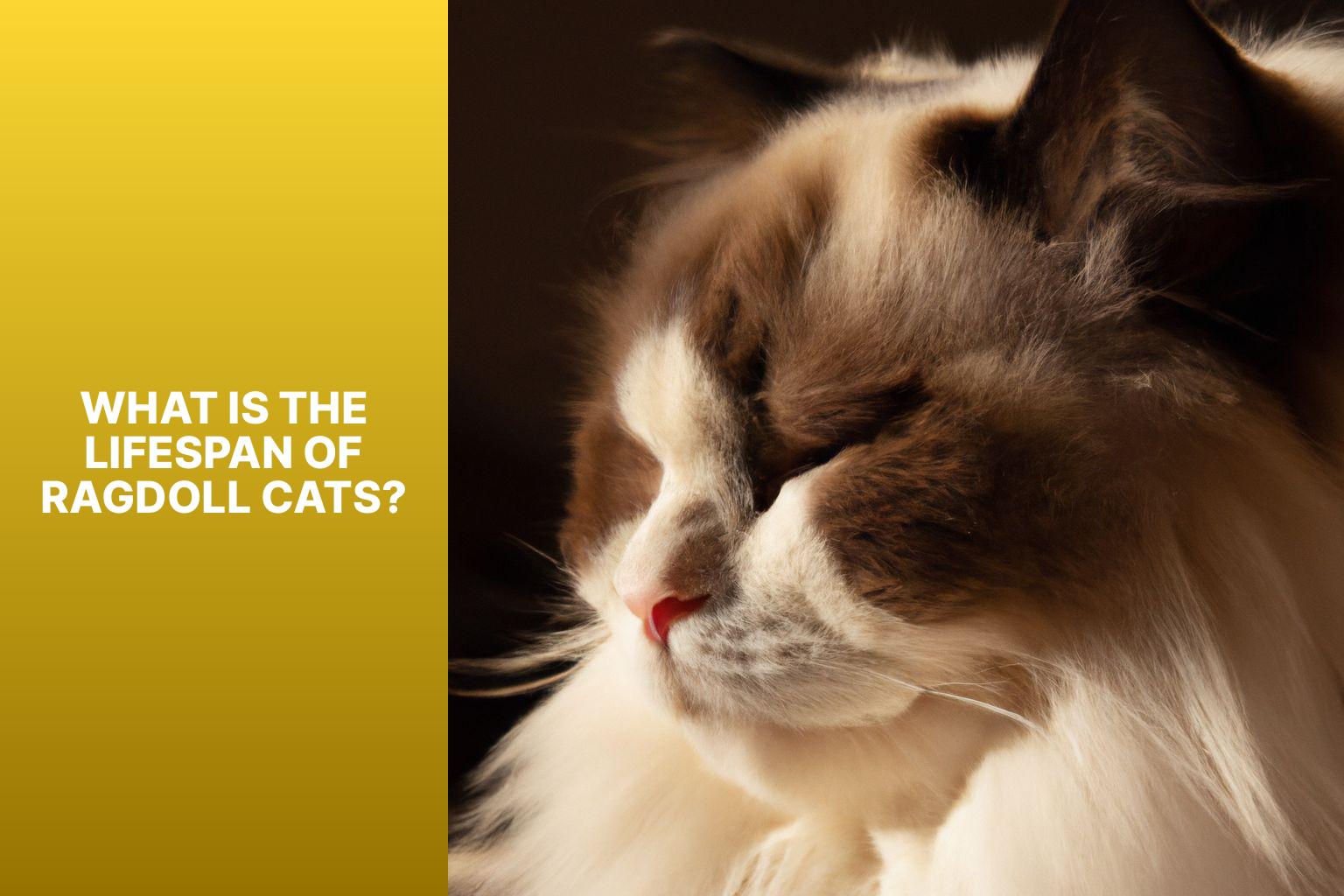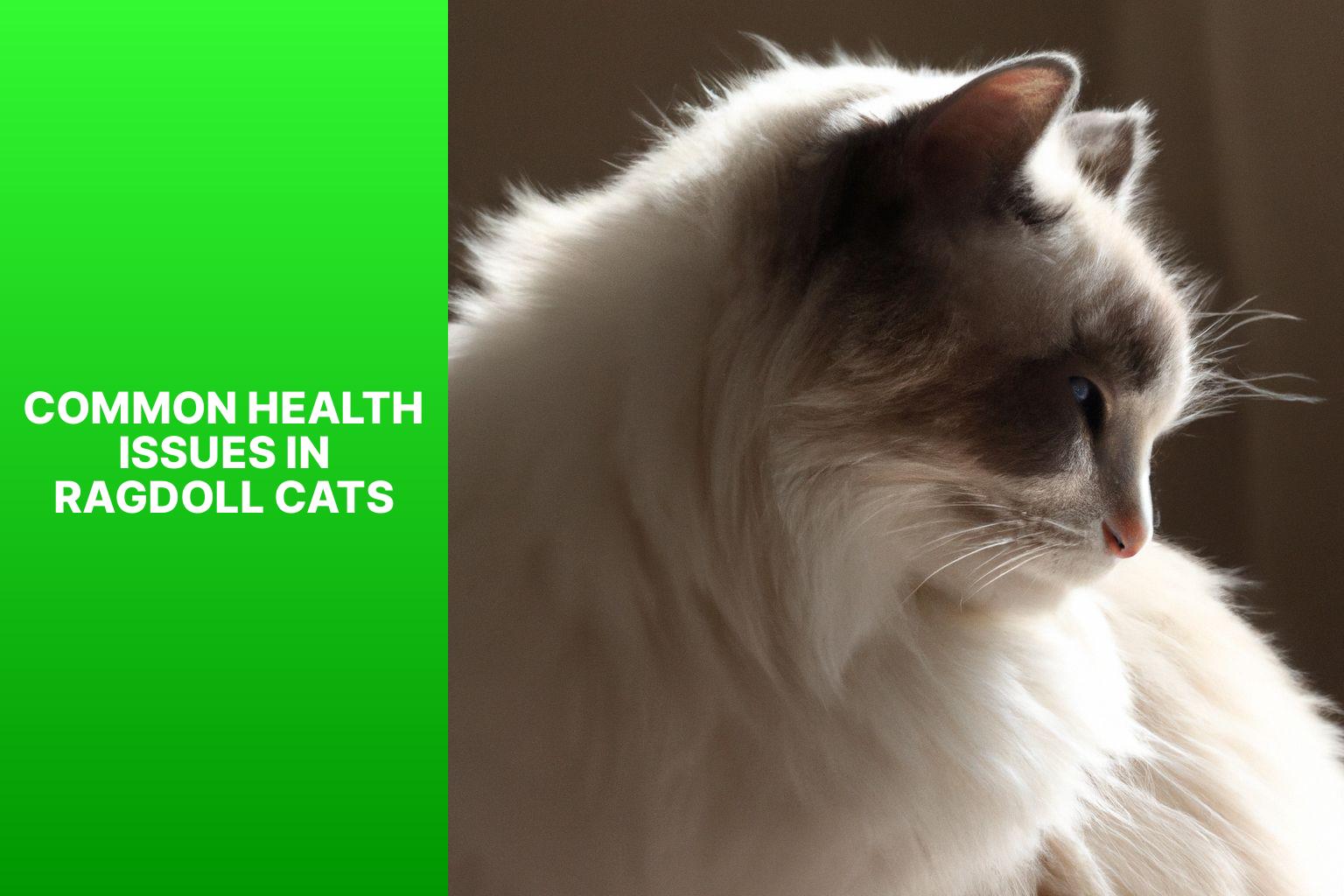Ragdoll cats are known for their striking appearance and gentle temperament. If you are considering adopting or already own a Ragdoll cat, it is essential to understand their lifespan and how to ensure their well-being.
What is the Lifespan of Ragdoll Cats?
The lifespan of Ragdoll cats can vary, but on average, they can live between 12 to 17 years. With proper care and management of their health, it is possible for some Ragdoll cats to live even longer.
Factors Affecting the Lifespan of Ragdoll Cats
Several factors can influence the lifespan of Ragdoll cats. Genetics, quality of breeding, overall health, and lifestyle play significant roles. Responsible breeders who prioritize the health and well-being of their cats can improve the chances of longer lifespans for Ragdolls.
Common Health Issues in Ragdoll Cats
While Ragdoll cats are generally healthy, there are a few health issues that are more commonly seen in this breed. Being aware of these conditions can help you identify any potential problems early and seek appropriate treatment. Some common health issues in Ragdoll cats are:
1. Hypertrophic Cardiomyopathy: A heart condition that can affect Ragdolls, leading to thickening of the heart muscles and potentially causing heart failure.
2. Polycystic Kidney Disease: A genetic condition that causes the formation of cysts in the kidneys. Regular monitoring can help manage this condition effectively.
3. Feline Lower Urinary Tract Disease: This condition can result in bladder inflammation and urinary blockages. It is crucial to provide a suitable diet and ensure proper hydration to minimize the risk.
Tips for Increasing the Lifespan of Ragdoll Cats
While you cannot control all aspects of a Ragdoll cat’s health, there are steps you can take to increase their lifespan and overall well-being. Some tips for extending the lifespan of Ragdoll cats include:
1. Regular Veterinary Check-ups: Schedule regular check-ups with a veterinarian to monitor their health, identify any potential issues, and receive appropriate vaccinations.
2. Proper Nutrition and Diet: Feed your Ragdoll cat a balanced and nutritious diet, following guidelines provided by your veterinarian. Avoid overfeeding and provide a suitable diet for their specific needs.
3. Regular Exercise and Mental Stimulation: Engage your Ragdoll cat in regular play and exercise to keep them physically active and mentally stimulated.
4. Dental Care: Dental health is essential to prevent oral diseases that can impact overall well-being. Regularly brush your cat’s teeth and provide dental treats or toys.
5. Stress Reduction: Ragdoll cats are sensitive to stress, so create a calm and peaceful environment for them. Minimize exposure to loud noises, provide cozy hiding spaces, and spend quality time with them.
By understanding the lifespan of Ragdoll cats, being aware of common health issues, and following these tips, you can help ensure your Ragdoll cat lives a long, healthy, and happy life.
- Ragdoll cats have a relatively long lifespan compared to other cat breeds.
- The lifespan of a Ragdoll cat can be influenced by various factors such as genetics, diet, and overall health care.
- Common health issues in Ragdoll cats include hypertrophic cardiomyopathy, polycystic kidney disease, and feline lower urinary tract disease.
- Regular veterinary check-ups are essential for maintaining the health and well-being of Ragdoll cats.
- Providing proper nutrition, a balanced diet, regular exercise, and mental stimulation can contribute to the longevity of Ragdoll cats.
- Dental care is important to prevent dental disease and maintain good overall health.
- Reducing stress and providing a calm environment can help ensure a longer lifespan for Ragdoll cats.
What is the Lifespan of Ragdoll Cats?
Photo Credits: Www.Catcornerblog.Com by Arthur Rodriguez
Curious about the lifespan of Ragdoll cats? Let’s explore what factors influence their longevity. Discover the key elements that affect the lifespan of these adorable felines. Buckle up as we dive into the fascinating world of Ragdoll cats and uncover the secrets behind their lifespan. Get ready for a whirlwind of information, insights, and surprises that will leave you with a newfound appreciation for these delightful creatures. Prepare to be amazed!
Factors Affecting the Lifespan of Ragdoll Cats
1. Genetics: Ragdoll cats inherit genetic traits that impact their lifespan. Select a reputable breeder who prioritizes breeding for health and longevity to minimize the risk of inherited health issues.
2. Nutrition: Providing a balanced and nutritious diet is crucial for the overall health and lifespan of Ragdoll cats. Feed them high-quality commercial cat food that meets their dietary needs, including essential nutrients and vitamins, to promote a longer lifespan.
3. Exercise: Regular physical activity is essential for maintaining a healthy weight and preventing obesity-related health problems in Ragdoll cats. Provide opportunities for exercise and mental stimulation, such as interactive toys or play sessions, to help extend their lifespan.
4. Veterinary Care: Regular veterinary check-ups are vital for early detection and prevention of health issues in Ragdoll cats. Include vaccinations, parasite control, and dental care in their routine healthcare to ensure their well-being and longevity.
5. Stress Reduction: Creating a calm and stress-free environment is essential for Ragdoll cats. Minimize exposure to loud noises, abrupt changes in routine, or conflicts with other pets to reduce stress levels and promote a longer, healthier life.
By considering these factors and providing proper care, attention, and a nurturing environment, owners can enhance the lifespan of their Ragdoll cats and enjoy their companionship for many years.
Common Health Issues in Ragdoll Cats
Photo Credits: Www.Catcornerblog.Com by Albert Miller
Ragdoll cats are beloved companions, but like any breed, they can face certain health issues. In this section, we’ll uncover some common concerns that affect the well-being of Ragdolls. From the potentially serious hypertrophic cardiomyopathy to polycystic kidney disease and feline lower urinary tract disease, we’ll shed light on these health challenges. We’ll also explore the importance of regular vet check-ups, a nutritious diet, exercise, dental care, and stress reduction in keeping Ragdolls happy and healthy. Let’s dive into the world of Ragdoll cat health together!
Hypertrophic Cardiomyopathy
Hypertrophic Cardiomyopathy is a common health issue that can affect the lifespan of Ragdoll cats. It is a heart condition characterized by thickening of the heart muscles, making it difficult for the heart to pump blood effectively. This condition can cause breathing difficulties, lethargy, and fainting.
Severe cases of hypertrophic cardiomyopathy can be life-threatening for Ragdoll cats. Cat owners should be aware of the signs and symptoms and seek veterinary care if they suspect their cat may be affected. Regular check-ups are crucial to monitor heart health and detect abnormalities early.
Proper nutrition and diet are important in managing hypertrophic cardiomyopathy. Cats with this condition may require a low-sodium diet that promotes heart health. Consulting with a veterinarian is best to determine the most suitable diet.
Luna, a Ragdoll cat, was diagnosed with hypertrophic cardiomyopathy at 6 years old. Luna’s owner, Sarah, noticed lethargy and difficulty breathing. Sarah immediately took Luna to the veterinarian, where the diagnosis was made. With medication, a specialized diet, and regular check-ups, Luna’s condition has been effectively managed. Luna is now 8 years old and enjoying a good quality of life. Sarah’s proactive approach in seeking veterinary care and following the treatment plan has significantly contributed to Luna’s extended lifespan.
Polycystic Kidney Disease
Polycystic Kidney Disease (PKD) is a common health issue in Ragdoll cats. It causes fluid-filled cysts to form in the kidneys. Symptoms appear when the cysts grow large enough to affect kidney function.
Ragdoll cats with PKD may experience increased thirst, frequent urination, weight loss, fatigue, and poor appetite. If left untreated, PKD can progress to life-threatening kidney failure.
Regular veterinary check-ups are crucial for early detection of PKD. Veterinarians can use ultrasounds to assess the size and number of kidney cysts, as well as genetic tests to determine if a cat carries the PKD gene before breeding.
While there is no cure for PKD, managing the condition can extend the lifespan of affected Ragdoll cats. Veterinarian-recommended nutrition and diet plans that include a low-sodium diet and adequate hydration support kidney health.
Reducing stress in the cat’s environment can also be beneficial, as stress can worsen PKD symptoms. Mental stimulation and regular exercise help keep the cat’s mind and body active.
To manage polycystic kidney disease and increase the lifespan of affected Ragdoll cats, early detection, regular veterinary care, proper nutrition, and stress reduction are essential.
Feline Lower Urinary Tract Disease
Feline Lower Urinary Tract Disease is a common health issue that affects Ragdoll cats. This condition involves inflammation and infection of the urinary tract, which includes the bladder and urethra. Be aware of the signs and symptoms of this disease to provide appropriate care for your cat.
- Cats with Feline Lower Urinary Tract Disease may have difficulty urinating or urinate more frequently.
- Hematuria, or blood in the urine, is a common symptom of this disease.
- Cats may show signs of discomfort while urinating, such as vocalization or excessive licking of the genital area.
- In severe cases, Feline Lower Urinary Tract Disease can cause a complete blockage of the urethra, which requires immediate veterinary attention.
If you suspect your Ragdoll cat has Feline Lower Urinary Tract Disease, consult a veterinarian for diagnosis and treatment options. This may include medication, dietary changes, or surgery if necessary. Preventative measures like providing clean water, a balanced diet, and regular exercise can help reduce the risk of this condition. By being proactive and attentive to your cat’s urinary health, you can ensure their overall well-being and help them live a long and healthy life.
Regular Veterinary Check-ups
Regular veterinary check-ups are an essential part of maintaining the health and well-being of Ragdoll cats. Here are some crucial reasons why regular veterinary check-ups are necessary for Ragdoll cats:
-
Early detection of health issues: Regular check-ups help to identify any health problems or underlying conditions in Ragdoll cats early on. This enables timely treatment and ultimately increases their lifespan.
-
Vaccinations and preventive care: Through regular check-ups, Ragdoll cats can receive the necessary vaccinations and preventive care. This protects them from infectious diseases and parasites, reducing the risk of serious health complications.
-
Dental health: Check-ups include thorough examinations of the teeth and gums of Ragdoll cats. This allows for any required cleanings or treatments, preventing dental diseases and related health issues.
-
Monitoring weight and nutrition: Regular check-ups help in monitoring the weight and nutrition of Ragdoll cats. This allows for dietary recommendations to ensure a balanced diet, promoting optimal health and preventing obesity or malnutrition.
-
Behavior and mental health: Check-ups also assess the behavior and mental well-being of Ragdoll cats. This provides guidance on environmental enrichment and mental stimulation, fulfilling their emotional needs.
By scheduling regular veterinary check-ups, Ragdoll cat owners can ensure the overall health and longevity of their beloved pets. Remember, prevention is always better than cure when it comes to the well-being of our feline friends.
Proper Nutrition and Diet
Proper nutrition and diet play a vital role in maintaining optimal health and extending the lifespan of Ragdoll cats. When it comes to their diet, consider the following recommendations:
– Ensuring a well-balanced diet: Ragdoll cats require a mix of protein, carbohydrates, and fats in their meals. It is advisable to opt for high-quality commercial cat food that is specifically formulated for their age and health condition.
– Choosing between wet and dry food: Both wet and dry cat food options are suitable for Ragdolls, but wet food can be particularly beneficial as it helps fulfill their hydration needs due to its higher water content. Dry food can also contribute to their dental health.
– Avoiding overfeeding: It is important to follow the feeding guidelines provided by the cat food manufacturer and adjust portion sizes based on the cat’s weight and activity level. Overfeeding can lead to obesity and various associated health issues.
– Offering variety in flavors and textures: Cats, including Ragdolls, appreciate diversity in their diet. Introduce different flavors and textures to keep them interested and ensure they receive all the necessary nutrients.
– Steer clear of toxic foods: It is crucial to keep certain foods such as chocolate, onions, garlic, and specific plants out of reach for your Ragdoll cat, as they can be toxic to them. By creating a hazard-free environment, you can avoid any potential harm.
By providing your Ragdoll cat with the right nutrition and a well-balanced diet, you are setting the stage for their overall well-being and increasing their chances of leading a long and healthy life.
Regular Exercise and Mental Stimulation
Regular exercise and mental stimulation are critical for the well-being and overall health of Ragdoll cats. It is important to engage your Ragdoll cat in daily play sessions using interactive toys, such as feather wands or puzzle toys. Aim for at least 15-20 minutes of active playtime each day to keep your cat physically and mentally stimulated.
To provide additional opportunities for exercise, consider introducing climbing structures or cat trees in your home. These vertical spaces encourage your cat to engage in exploratory and playful behavior. Interactive games like fetch or laser pointer activities can provide both mental stimulation and physical activity for your cat.
By engaging in regular exercise and mental stimulation, you can prevent behavioral issues that may arise from boredom or pent-up energy. It is important to adapt the exercise routine based on your cat’s age, fitness level, and any underlying health conditions they may have. Creating a safe and enriching environment by rotating toys and play areas will also help keep your Ragdoll cat happy and healthy.
Remember, prioritizing regular exercise and mental stimulation contributes to the longevity and well-being of your beloved Ragdoll cat.
Dental Care
Dental care is crucial for maintaining the overall health and well-being of Ragdoll cats. When it comes to their dental care, here are some essential factors to keep in mind:
-
Implement regular tooth brushing: It is important to brush your cat’s teeth on a regular basis in order to prevent dental issues such as tartar buildup and gum disease. Make sure to use a toothbrush and toothpaste specifically designed for cats. Begin with short brushing sessions and gradually increase the duration.
-
Provide dental treats and toys: Offering dental treats and toys to your Ragdoll can help in keeping their teeth clean and healthy. Look for specially formulated treats that encourage chewing and aid in the removal of plaque and tartar.
-
Schedule professional dental cleanings: Professional dental cleanings by a veterinarian are necessary for a thorough and deep cleaning. These cleanings can effectively remove stubborn tartar buildup and address any underlying dental problems.
-
Stay vigilant for signs of dental issues: Keep an eye out for signs of dental problems, such as bad breath, swollen or bleeding gums, difficulty eating, or excessive drooling. If you notice any of these symptoms, consult your veterinarian promptly.
Pro-tip: It is advisable to have a conversation with your veterinarian for personalized dental care advice tailored to your cat’s specific needs. This will help in maintaining their oral health effectively.
Stress Reduction
Stress reduction is paramount for the well-being of Ragdoll cats. These feline companions can experience stress due to changes in their environment, separation anxiety, or conflicts with other pets. All of these factors can have a negative impact on their immune system and increase health risks.
To effectively reduce stress in Ragdoll cats, here are some tips to follow:
1. Create a calm and safe environment: It is important to designate a space in your home where your cat can relax and have solitude. Providing hiding spots, comfortable bedding, and minimizing noise can greatly contribute to their well-being.
2. Stick to a consistent routine: Cats thrive on routine and predictability. By establishing a consistent schedule for feeding, playtime, and grooming, you can make your Ragdoll cat feel secure and reduce their anxiety levels.
3. Encourage play and mental stimulation: Engaging your Ragdoll cat in interactive play sessions using toys that stimulate their natural hunting instincts can help alleviate their stress and boredom.
4. Use pheromone products: Consider utilizing Feliway, a synthetic pheromone product, to create a sense of calmness and security in your cat. You can use diffusers or sprays in the areas where your cat spends the most time.
5. Provide vertical spaces: Installing cat trees or shelves will allow your Ragdoll cat to climb and perch at elevated positions. This gives them the opportunity to observe their surroundings from above and feel safe.
By implementing these stress reduction techniques, you can contribute to your Ragdoll cat’s overall well-being and help them live a longer and happier life.
Pro-tip: Regular play sessions not only reduce stress but also strengthen the bond between you and your Ragdoll cat. Make sure to interact and engage with them daily to enhance your relationship and improve their quality of life.
Some Facts About How Long Ragdoll Cats Live:
- ✅ The average lifespan of a Ragdoll cat is 15 to 25 years. (Source: Our Team)
- ✅ Compared to other cat breeds, Ragdoll cats have a longer average lifespan. (Source: Our Team)
- ✅ Good genes play a significant role in determining a Ragdoll cat’s lifespan. (Source: Our Team)
- ✅ Factors such as congenital defects, infections, diseases, and accidents can affect a Ragdoll cat’s lifespan. (Source: Our Team)
- ✅ Keeping Ragdoll cats indoors, providing high-quality cat food, exercise opportunities, and love can increase their life expectancy. (Source: Our Team)







